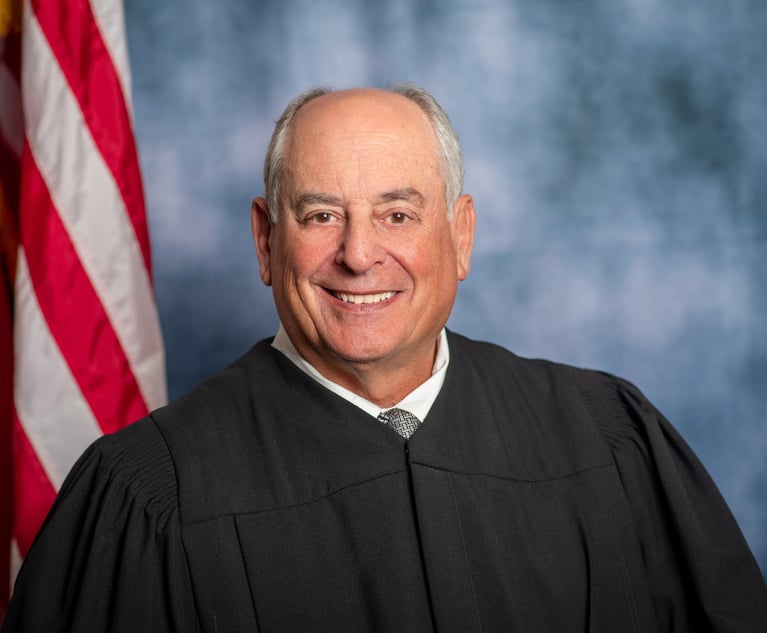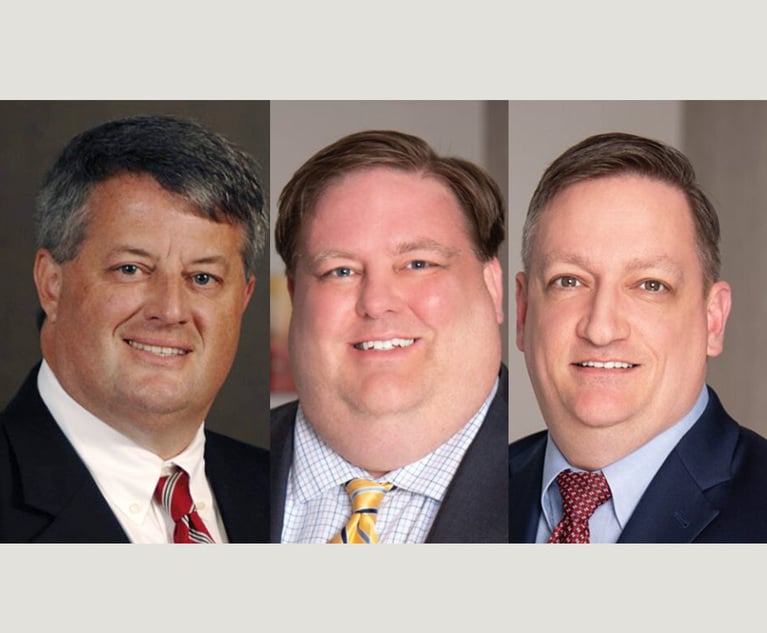 (Photo: Photographee.eu/Shutterstock.com
(Photo: Photographee.eu/Shutterstock.comGeorgia Supreme Court Cites Anti-SLAPP Law and Sides With Florida Law Firm in Dispute With Nursing Homes
On Monday, the high court reversed and remanded a trial court's denial of the Wilkes & McHugh law firm's motion to dismiss the suit brought against them by LTC Consulting and other parties. The plaintiffs operate several nursing homes in Georgia, and alleged ads taken out by the firm misrepresented conditions at their facilities.
June 24, 2019 at 02:49 PM
5 minute read
The Supreme Court of Georgia has ruled favorably for a Florida attorney and law firm fighting legal action brought against them by nursing homes in Georgia.
On Monday, the Georgia Supreme Court issued an opinion finding a Cobb County trial court did not properly consider Gary Wimbish's and the Wilkes & McHugh law firm's motion to dismiss fraud complaints brought against them by LTC Consulting and other Georgia health care providers.
Rockdale Healthcare Center, which is owned by LTC Consulting, along with Powder Springs Transitional Care and Rehabilitation and Bonterra Transitional Care and Rehabilitation commenced litigation against the Tampa attorney and his employer after the law firm named them in advertisements taken out in local Georgia newspapers.
The notices, which emphasized they were legal advertisements, sought testimonials from residents at the companies' facilities, and listed deficiencies found at the nursing homes during government inspections.
The plaintiffs alleged the ads were misleading. They were granted temporary restraining orders against the firm, prohibiting publishing “any false, fraudulent, deceptive and misleading advertisements concerning the plaintiffs,” according to Monday's order.
In a unanimous opinion written by Justice Michael P. Boggs, the Georgia Supreme Court held the lower court did not apply the parameters of recent revisions to the state's anti-SLAPP statutes in their order denying the defendant's motion to dismiss the claim. Boggs wrote a 2016 amendment to the state's rules regarding strategic lawsuits against public participation ”fundamentally altered the mechanics of the anti-SLAPP procedure” in Georgia.
“First, the court must decide whether the party filing the anti-SLAPP motion (usually, the defendant) has made a threshold showing that the challenged claim is one 'arising from' protected activity,” Boggs said. “If a court concludes that this threshold showing has been made, it must proceed to the second step of the analysis and decide whether the plaintiff has established that there is a probability that the [plaintiff] will prevail on the claim.'”
The Georgia Supreme Court found “the defendants met their burden under [Georgia's anti-SLAPP law] to show that the plaintiffs' claims are ones arising from acts that could reasonably be construed as acts in furtherance of the defendants' right of free speech,” subsequently shifting the onus to the plaintiffs to prove there was a likelihood they'd prevail on their claim. Although the trial court found the plaintiffs prevailed in that respect, in turn preventing a dismissal of the lawsuit, Boggs wrote the lower court “did not apply the proper standards at step two of the anti-SLAPP analysis.”
Read the Georgia Supreme Court ruling:
“There was no discussion or analysis of whether the plaintiffs had 'stated and substantiated a legally sufficient claim' for violations of the cited statutes,” Boggs wrote, citing a requirement outlined in the 2016 amendment to Georgia's anti-SLAPP law. “To meet this burden, 'the plaintiff must demonstrate that the complaint is both legally sufficient and supported by a sufficient prima facie showing of facts to sustain a favorable judgment if the evidence submitted by the plaintiff is credited.'” The supreme court vacated the trial court's denial of the the defendants' anti-SLAPP motion and remanded the case for further review.
Leighton Moore of the Moore Law Firm in Atlanta represented Wimbish and Wilkes & McHugh before the high court alongside attorney Meredith Watts. Moore said the court “clearly had some misgivings about whether the plaintiffs claims are legally viable.”
“But I wanted to give the trial court the chance to rule on that first, and we look forward to going back to the trial court and obtaining a ruling,” he said.
Arnall Golden Gregory attorneys Jason Bring and Kara Silverman served as legal counsel to the plaintiffs. Bring, a partner at Arnall Golden Gregory, regarded the ruling as a positive.
“The defendant had asked for the Supreme Court to throw out the case entirely, and we argued it was premature to do so,” he said. “This allows the trial court to address the constitutional issues raised by the defendants.”
Moore said the takeaway from the Supreme Court's ruling is the “very broad sweep” of the 2016 amendments to Georgia's anti-SLAPP statute.
“It applies in more cases than it used to. It's important to keep up with the changes in the statute and not just read the case law,” he said. “If you only read the case law and didn't read the statute, you'd think the statute is much narrower than it is.”
Related stories:
This content has been archived. It is available through our partners, LexisNexis® and Bloomberg Law.
To view this content, please continue to their sites.
Not a Lexis Subscriber?
Subscribe Now
Not a Bloomberg Law Subscriber?
Subscribe Now
NOT FOR REPRINT
© 2024 ALM Global, LLC, All Rights Reserved. Request academic re-use from www.copyright.com. All other uses, submit a request to [email protected]. For more information visit Asset & Logo Licensing.
You Might Like
View All
'A 58-Year-Old Engine That Needs an Overhaul': Judge Wants Traffic Law Amended
3 minute read
Fulton Jury Returns Defense Verdict After Pedestrian Killed by MARTA Bus
8 minute read
'The Best Strategy': $795K Resolution Reached in Federal COVID-Accommodation Dispute
8 minute read
Population and Caseload Boom Birth New West Georgia Judicial Circuit
7 minute readTrending Stories
- 1Decision of the Day: Judge Reduces $287M Jury Verdict Against Harley-Davidson in Wrongful Death Suit
- 2Kirkland to Covington: 2024's International Chart Toppers and Award Winners
- 3Decision of the Day: Judge Denies Summary Judgment Motions in Suit by Runner Injured in Brooklyn Bridge Park
- 4KISS, Profit Motive and Foreign Currency Contracts
- 512 Days of … Web Analytics
Who Got The Work
Michael G. Bongiorno, Andrew Scott Dulberg and Elizabeth E. Driscoll from Wilmer Cutler Pickering Hale and Dorr have stepped in to represent Symbotic Inc., an A.I.-enabled technology platform that focuses on increasing supply chain efficiency, and other defendants in a pending shareholder derivative lawsuit. The case, filed Oct. 2 in Massachusetts District Court by the Brown Law Firm on behalf of Stephen Austen, accuses certain officers and directors of misleading investors in regard to Symbotic's potential for margin growth by failing to disclose that the company was not equipped to timely deploy its systems or manage expenses through project delays. The case, assigned to U.S. District Judge Nathaniel M. Gorton, is 1:24-cv-12522, Austen v. Cohen et al.
Who Got The Work
Edmund Polubinski and Marie Killmond of Davis Polk & Wardwell have entered appearances for data platform software development company MongoDB and other defendants in a pending shareholder derivative lawsuit. The action, filed Oct. 7 in New York Southern District Court by the Brown Law Firm, accuses the company's directors and/or officers of falsely expressing confidence in the company’s restructuring of its sales incentive plan and downplaying the severity of decreases in its upfront commitments. The case is 1:24-cv-07594, Roy v. Ittycheria et al.
Who Got The Work
Amy O. Bruchs and Kurt F. Ellison of Michael Best & Friedrich have entered appearances for Epic Systems Corp. in a pending employment discrimination lawsuit. The suit was filed Sept. 7 in Wisconsin Western District Court by Levine Eisberner LLC and Siri & Glimstad on behalf of a project manager who claims that he was wrongfully terminated after applying for a religious exemption to the defendant's COVID-19 vaccine mandate. The case, assigned to U.S. Magistrate Judge Anita Marie Boor, is 3:24-cv-00630, Secker, Nathan v. Epic Systems Corporation.
Who Got The Work
David X. Sullivan, Thomas J. Finn and Gregory A. Hall from McCarter & English have entered appearances for Sunrun Installation Services in a pending civil rights lawsuit. The complaint was filed Sept. 4 in Connecticut District Court by attorney Robert M. Berke on behalf of former employee George Edward Steins, who was arrested and charged with employing an unregistered home improvement salesperson. The complaint alleges that had Sunrun informed the Connecticut Department of Consumer Protection that the plaintiff's employment had ended in 2017 and that he no longer held Sunrun's home improvement contractor license, he would not have been hit with charges, which were dismissed in May 2024. The case, assigned to U.S. District Judge Jeffrey A. Meyer, is 3:24-cv-01423, Steins v. Sunrun, Inc. et al.
Who Got The Work
Greenberg Traurig shareholder Joshua L. Raskin has entered an appearance for boohoo.com UK Ltd. in a pending patent infringement lawsuit. The suit, filed Sept. 3 in Texas Eastern District Court by Rozier Hardt McDonough on behalf of Alto Dynamics, asserts five patents related to an online shopping platform. The case, assigned to U.S. District Judge Rodney Gilstrap, is 2:24-cv-00719, Alto Dynamics, LLC v. boohoo.com UK Limited.
Featured Firms
Law Offices of Gary Martin Hays & Associates, P.C.
(470) 294-1674
Law Offices of Mark E. Salomone
(857) 444-6468
Smith & Hassler
(713) 739-1250






